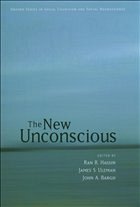Over the past two decades, a new picture of the cognitive unconscious has emerged from a variety of disciplines that are broadly part of cognitive science. According to this picture, unconscious processes seem to be capable of doing many things that were thought to require intention, deliberation, and conscious awareness. Moreover, they accomplish these things without the conflict and drama of the psychoanalytic unconscious. These processes range from complex information processing, through goal pursuit and emotions, to cognitive control and self-regulation.
This collection of 20 original chapters by leading researchers examines the cognitive unconscious from social, cognitive, and neuroscientific viewpoints, presenting some of the most important developments at the heart of this new picture of the unconscious.
The volume, the first book in the new Social Cognition and Social Neuroscience series, will be an important resource on the cognitive unconscious for researchers in cognitive psychology and neuroscience.
Contents
Introduction: Becoming aware of the new unconscious
Part 1: Fundamental questions
1 Who is the controller of controlled processes?
2 Bypassing the will: towards demystifying the nonconsious control of social behaviour
Part 2: Basic mechanisms
3 The interaction of emotion and cognition: the relation between the human amygdala and cognitive awareness
4 The power of the subliminal: on subliminal persuasion and other potential applications
5 Nonintentional similarity processing
6 The mechanics of imagination: automaticity and control in counterfactual thinking
7 Compensatory automaticity: unconscious volition is not an oxymoron
8 Non conscious control and implicit working memory
Part 3: Intention and theory of mind
9 Folk theory of mind: conceptual foundations of human social cognition
10 The development of the intention concept: from the observable world to the unobservable mind
11 Theory of mind: conscious attribution and spontaneous trait inference
Part 4: Perceiving and engaging others
12 The glimpsed world: unintended communication and unintended perception
13 Beyond the perception-behaviour link: the ubiquitous utility and motivational moderators of nonconscious mimicry
14 Implicit impressions
15 Attitudes as accessibility bias: dissociating automatic and controlled processes
16 The unconscious relational self
Part 5: Self regulation
17 The control of the unwanted
18 Motivational sources of unintended thought
19 Going beyond the motivational given: self-control and situational control over behaviour
This collection of 20 original chapters by leading researchers examines the cognitive unconscious from social, cognitive, and neuroscientific viewpoints, presenting some of the most important developments at the heart of this new picture of the unconscious.
The volume, the first book in the new Social Cognition and Social Neuroscience series, will be an important resource on the cognitive unconscious for researchers in cognitive psychology and neuroscience.
Contents
Introduction: Becoming aware of the new unconscious
Part 1: Fundamental questions
1 Who is the controller of controlled processes?
2 Bypassing the will: towards demystifying the nonconsious control of social behaviour
Part 2: Basic mechanisms
3 The interaction of emotion and cognition: the relation between the human amygdala and cognitive awareness
4 The power of the subliminal: on subliminal persuasion and other potential applications
5 Nonintentional similarity processing
6 The mechanics of imagination: automaticity and control in counterfactual thinking
7 Compensatory automaticity: unconscious volition is not an oxymoron
8 Non conscious control and implicit working memory
Part 3: Intention and theory of mind
9 Folk theory of mind: conceptual foundations of human social cognition
10 The development of the intention concept: from the observable world to the unobservable mind
11 Theory of mind: conscious attribution and spontaneous trait inference
Part 4: Perceiving and engaging others
12 The glimpsed world: unintended communication and unintended perception
13 Beyond the perception-behaviour link: the ubiquitous utility and motivational moderators of nonconscious mimicry
14 Implicit impressions
15 Attitudes as accessibility bias: dissociating automatic and controlled processes
16 The unconscious relational self
Part 5: Self regulation
17 The control of the unwanted
18 Motivational sources of unintended thought
19 Going beyond the motivational given: self-control and situational control over behaviour

